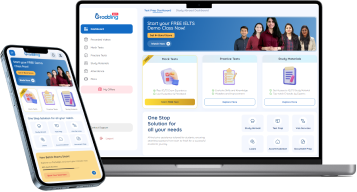Preparing for the IELTS exam can be a challenging task for most students because they have less knowledge of English. However, one of the most common questions students have in their mind is “How much time is required for IELTS preparation”? Well, it depends on the student’s English proficiency level, target band score, and familiarity with the test format. Moreover, in this blog, we will discuss the ideal IELTS preparation time for each section and the effective tips to prepare for the IELTS exam. So let’s get started with the blog.

Table of Contents
The IELTS exam is one of the world’s most popular English language proficiency exams. It tests a person’s ability to listen, read, write, and speak in less than three hours. However, the amount of time needed for IELTS preparation varies from one factor to another. It includes your English language proficiency, your target IELTS band score, and your study habits. Thus, some candidates need a few weeks of focused preparation, while others might require several months of dedicated study to achieve their desired band score.
Generally, the IELTS preparation time for students is 6-8 weeks or 2 months if you are already at an intermediate or advanced level. However, if you're starting from a basic or beginner level and aiming for a high band score, then you might need to give more time for IELTS preparation. During this time, students should focus on understanding the IELTS exam format and improve key areas such as grammar, reading speed, test-taking strategies, and writing skills. Moreover, it is also advisable for students to understand the specific requirements for each section of the IELTS exam to modify their preparation effectively. Thus, in the next parts of this section, you will find out about the preparation time for IELTS in each section. Let’s have a look below:
The IELTS listening section includes 40 questions across the four sections, with 10 questions. The level of difficulty increases in each section. However, the entire section lasts for about 40 minutes. Ideally, the preparation time for the IELTS listening section is 1 week, but you can take more time if you need to. Now read the below-given pointers and understand the types of tasks you can get in the listening section.
Furthermore, to excel in the IELTS listening section, you will need to take an IELTS listening practice test before the actual exam.
The IELTS writing section comprises two different types of tasks that test students' English language skills. It lasts for about 60 minutes. However, the IELTS preparation time for the writing section is ideally one week or two weeks not more than that. Read the below-given points and understand what IELTS writing tasks include.
Additionally, by taking the IELTS writing practice test you can achieve a desired band score in the exam.
The IELTS reading section comes with 40 questions, and it takes 60 minutes to complete the test. It is the same for both academic and general training versions. However, the IELTS preparation time for the reading section would be a few weeks if you have a high level of English proficiency. Now read the below-given points and understand what the IELTS reading section covers.
To score good marks in this section, you need to appear for the IELTS reading practice test before the actual exam.
The IELTS speaking section is conducted between the examiner and a candidate and lasts for about 11-14 minutes. It includes three parts. However, the ideal IELTS preparation time for the speaking section is one week, keeping aside the other sections. Now read the below-given pointers and see what the IELTS speaking section includes.
Additionally, to achieve a high band score you are required to take the IELTS speaking practice test that will help you know your weak areas. In the next section, you will find out about the weekly IELTS preparation schedule that will help you achieve a good score.
The total IELTS course duration is typically 4 to 12 weeks. However, to boost your score, you need to go through every essential skill step-by-step. Whether you’re aiming to strengthen your listening, reading, writing, and speaking skills, this one-week plan will provide a structured approach to help you achieve a good score. Thus, in this section, we have provided a week IELTS preparation schedule for your reference. Through this, you can boost your score on the IELTS exam.
| Monday | Listening | Listen to the English songs and write down the lyrics |
| Tuesday | Reading | Read a short story or article, noting down the new words |
| Wednesday | Speaking | Record yourself talking about your favorite topic |
| Thursday | Writing | Describe your daily routine in a diary |
| Friday | Grammar | Learn the basic grammar rules online |
| Saturday | Vocabulary | Learn 10 new words and use them in sentences |
| Sunday | Relax | Watch a movie or show with English subtitles. |
| Monday | Listening | Try to listen to a podcast and summarize it in writing |
| Tuesday | Reading | Read a longer article, highlighting and focusing on the key points |
| Wednesday | Speaking | Engage in English conversations with a friend |
| Thursday | Writing | Write a short essay on one of your favorite topic |
| Friday | Grammar | Study the structure of complex sentences |
| Saturday | Vocabulary | Learn synonyms and antonyms for 10 new words |
| Sunday | Relax | Review your week progress and modify your plan accordingly |
| Monday | Listening | Translate a TED talk or Youtube Video |
| Tuesday | Reading | Tackle a challenging academic paper or book |
| Wednesday | Speaking | Present a topic to a small group or mirror |
| Thursday | Writing | Write an IELTS-style essay on a given topic |
| Friday | Grammar | Dive into the advanced grammar and syntax |
| Saturday | Vocabulary | Create the flashcards for 20 advanced words |
| Sunday | Relax | Evaluate your progress of one week |
| Monday | Listening | Appear for a full-length IELTS listening practice test |
| Tuesday | Reading | Complete an IELTS reading practice test |
| Wednesday | Speaking | Execute a IELTS speaking practice test with a friend |
| Thursday | Writing | Write a full IELTS essay under the time pressure |
| Friday | Grammar | Master the complex sentences |
| Saturday | Vocabulary | Revise and memorize the challenging vocabulary |
| Sunday | Relax | Evaluate yourself and plan your strategy for the exam |
Overall, the required IELTS preparation time is based on the individual capability. Thus, we have provided a one-week plan for achieving good scores in the IELTS exam. In the next section, you will find out some helpful tips and strategies for the IELTS test.
The IELTS test involves understanding the format, and how the scores are marked, and then making a proper plan for achieving good scores. Thus, in this section have a brief look at the IELTS preparation tips for 8+band score.
To conclude, we discussed the IELTS preparation time for each section and talked about the weekly schedule for the IELTS exam. Further, in the blog, some helpful tips have been mentioned for achieving a high band score. However, if you are facing issues in preparing for the IELTS exam then you are on the right page! Connect with us and join our IELTS coaching online or offline and achieve 8+band scores with us.
On average, it is recommended that preparation time for IELTS is 2-3 months if you are already at an intermediate or advanced level of English.
No, scoring 7.0 or above in the IELTS exam is not an impossible task. Students must understand the syllabus and format of the exam and then start preparing for the same.
There are several ways to prepare for IELTS at home that are cost-effective and time-efficient. Before you start preparing, make sure that you are clear on which test you need to go for (Academic and General Training)
It is recommended that you solve 1 or 2 practice tests daily for each section. In other words, they should be very small but can be an important part of your preparation.
It is advised to spend three to four hours daily focusing on test-taking abilities, techniques, and speed. However, the preferable IELTS exam preparation time is at least 30 days studying all the sections.

We are available in :
BangaloreAhmedabadJaipurHyderabadKeralaPuneChandigarhMumbaiGurgaonChennaiKolkataTrivandrumNoidaKochiCalicutKottayamKollamThrissurIndoreUdaipurdisclaimer:logos and other registered trademarks of universities used on this platform are held by their respective owners. Gradding does not claim ownership or association on them, and their use is purely for informational and illustrative purposes.



